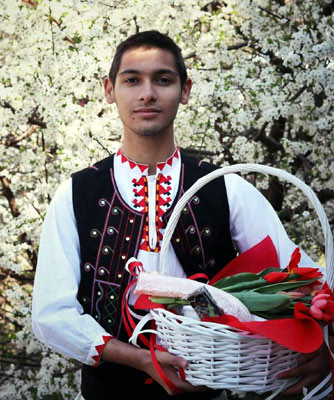On May 11 (Saturday) Vazrazhdane Square in the town of Yablanitsa will host the first edition of the Halva and Lokum Festival organized entirely by students. They undertook this initiative, because they want to inspire their coevals to be more enterprising and show that young people can do a lot of they work hard and are well-educated. Fifteen-year-old Galin Alexandrov from the village of Rumiantsevo, who is one of the organizers of the event, told Radio Bulgaria details:
 The guests of the festival can taste local halva (a soft fudge-like candy made of sesame paste) and lokum (Turkish delight). These sweet products are typical of the Yablanitsa region and are distinguished for their traditional taste. The festival also includes folklore songs and dances. The program also envisages motivational speeches to the young people and the adults. Presentations on how the manufacture of halva and lokum became traditional are also part of the festival’s program.
The guests of the festival can taste local halva (a soft fudge-like candy made of sesame paste) and lokum (Turkish delight). These sweet products are typical of the Yablanitsa region and are distinguished for their traditional taste. The festival also includes folklore songs and dances. The program also envisages motivational speeches to the young people and the adults. Presentations on how the manufacture of halva and lokum became traditional are also part of the festival’s program.
We receive support from the institutions and the adults and our idea attracted the interest of our coevals, Galin Alexandrov went on to say and added:
We hope that when the festival ends the local young residents will be filled with inspiration and desire to organize similar events in the future and step in our shoes.
The organization of the festival of halva and lokum, however, did not go that smooth:
We faced several challenges. One of the biggest challenges was to create the concept of the festival. The idea was like a cloud in our heads. When we met with the representatives of Yablanitsa Municipality, local people and producers of halva we gradually formed our concept of the event and the whole picture got clearer. Thus, we started to discover the road to the successful fulfillment of the festival’s programme.
The biggest challenge during the organization of the festival was to contact the producers of halva and convince them to participate at the event, because some of them had doubts whether the organization would be successful due to the fact that it was organized by children. However, we managed to attract their attention. We went through every obstacle through meetings with representatives of the local authorities. We wanted to stay true to the message we send-We Create with the Power of Dialogue and Our Friendship.
The organizers of the halva festival hope that the event will become a tradition and that more growing up children will be attracted to its preparation, Galin Alexandrov says and adds:
We want to awaken the entrepreneurship in the young people with our activity and serve as an example. We want to prove that people like them from villages or small Bulgarian towns can make their dreams come true. We want them to know that they can reach any change if they believe it is possible. Our purpose is to awaken the young people and build trust between the adults and the young generation, because we are the future of the world.
English version: Kostadin Atanasov
Photos: private libraryIn 2024, Bulgaria has 15,737 foreign students, making up 8.6% of all current students in the country. By comparison, this share has doubled over the past decade. This data comes from NACID , updated annually in the Bulgarian University Ranking..
Divers will clean the seabed around the port of Sozopol today, reports BTA. "Since 2018, we have been doing the cleaning, completely voluntarily, with our own resources, with the idea of doing something useful for everyone," said Nayden Nedev, diving..
The roof of the National High School of Applied Arts in Tryavna , a cultural landmark with almost a century of history, was destroyed in a fire early this morning. The blaze broke out around 3 a.m. and spread rapidly due to the building's wooden beam..
A pink pelican has become a real attraction for the residents of Varna. Hundreds of people have spotted it in the area of the Marine Station in the..
This year, Orthodox and Catholic Christians will celebrate the Resurrection of Christ togethe r. On the same date, the entire Christian world will turn..
Artist Vanya Petkova from Kardzhali paints non-traditional icons, depicting saints on ostrich eggs . She started about 15 years ago with images of Jesus..

+359 2 9336 661
